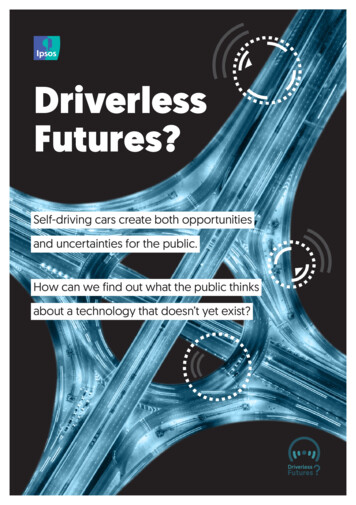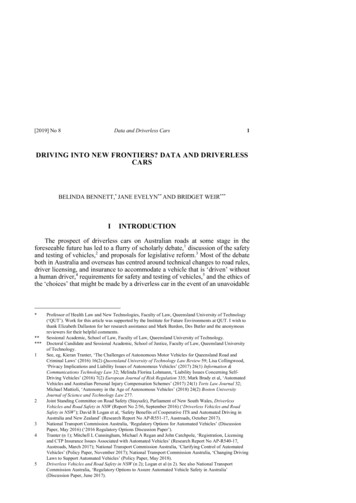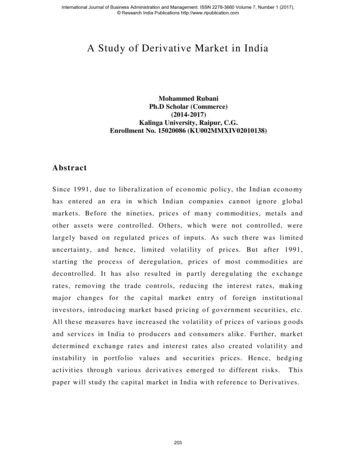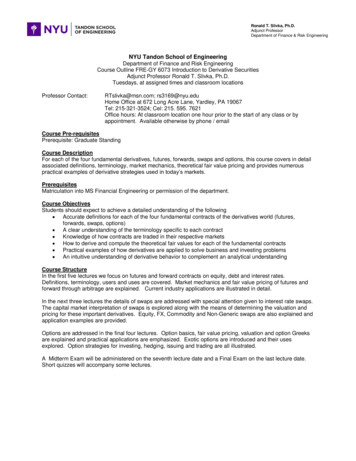
Transcription
DriverlessFutures?Self-driving cars create both opportunitiesand uncertainties for the public.How can we find out what the public thinksabout a technology that doesn’t yet exist?
Less than a decade ago, self-driving carsseemed impossible. Now, we are told,they are inevitable. The benefits and therisks are not yet clear, but the technologyis likely to make a profound difference topeople’s lives. We have heard a lot fromthe developers, but, if the technology isto realise its potential, we also need tounderstand what members of the publicthink and, just as importantly, how theythink about self-driving cars.A NEW WAY OF LIFE?According to OECD projections, globalpassenger demand will more than doublebefore 2050, most of it in Asia1. The newmobility technologies that will meet thisdemand could be an opportunity tochange transport systems, or they couldsimply make existing problems worse.Self-driving cars, as part of increasinglysmart transport systems, could help easeproblems of safety, congestion, pollutionand accessibility. But this will not just bea matter of a computer taking over thedriving; there will be a number of differentways motorists, pedestrians and othertravellers will be affected. Self-driving carscould be a 21st Century disruption as big asthe introduction of the motorcar in the 20thCentury. Our streets, our ways of life, therules of the road and the shape of ourcities could all change.We might not know exactly how thisdisruption will play out, but Ipsos MORIsurveys and dialogues give us hints onhow the public tend to respond to newtechnologies; as well as giving us earlythoughts on views of autonomous vehicles.
ENTHUSIASM VARIES BETWEENCOUNTRIESEarly surveys suggest that members ofthe public are interested in self-driving cartechnology, but also sceptical. Worldwide,fully autonomous driving is rated as themost interesting potential new featureof a car of the future2, but the level ofenthusiasm varies markedly from place toplace.People in Britain are among the mostnegative in the world. Over half of Britsthink travelling in a self-driving car will beeasier, but only 36% think it will be moreenjoyable and 44% think it will be morecomfortable. In India, nearly 80% lookforward to the benefits of greater ease,comfort and enjoyment3.Britons and Germans like drivingthemselves. Half say they are worried thatself-driving features would take away toomuch control from the driver4. The samenumber would always, or nearly always,drive themselves even if there was anautonomous driving function. Othernations tend to be more ready to sit backand let the computer do the driving5.As well as national differences, thereare differences by age group andcohort, which might affect the ways thatautonomous car producers bring theirideas to market over the next few years.Older drivers are disproportionatelybuying new cars (the average age of acar buyer in the US is around 50)6, butthese groups are much less interestedthan younger drivers in features likeautomated parking, fully autonomousdriving, connected route services, andtele-diagnostics7.HOW IMPORTANT IS FULLY AUTONOMOUS DRIVING, AND HOW WILLING ARETHE PUBLIC TO PAY?Fully Autonomous Driving - no need to touch the steering wheel, cars can drivethe whole trip (both on freeway or in cities).Willingness to paymore for car ortance of car featuresBase: UK n 19;249, United States n 22;665, Germany n 14,580; France n 31,612; Italy n 16,814; Spain n 10,859;Brazil n 5,218; Japan n 9,060; China n 7,28360UKUSGermanyFranceItalySpainBrazilJapanChina
THE PUBLIC ARE CITIZENS, NOTJUST CONSUMERSSelf-driving car technology is clearlymore than just another set of featureson a conventional car. We need tounderstand what citizens think, whenthey are in cars and when they arenot: Do they trust that the technologywill be safe? How safe will be safeenough? Are they concerned aboutinequalities? What do they think abouttheir data as cars become computers?Who do they think will benefit? Doprofessional drivers worry abouttheir jobs?There are challenges in talking aboutemerging technologies. Risks andbenefits are uncertain and thedirection of the technology canchange. It is therefore important tounderstand how members of thepublic think. Qualitative evidence isjust as important as quantitative.Different public groups will prioritisedifferent issues. Some will considerself-driving cars from a practical,personal perspective: how can I getaround quickly and safely? Theremay be a simple risk-reward tradeoff. 47% of the British public supportthe development of driver assistancetechnology if they are asked in thecontext of “improving safety” 8. Others,however, will be concerned aboutwider economic or environmentalissues. These are harder to teaseout in surveys, but dialogue and4deliberation on the principles whichshould underpin the governance ofautomation will be constructive9.WHAT ARE PEOPLE WORRIEDABOUT?The Ipsos Global Trends Survey hasBritons as optimists when it comesto technology overall, despitetheir relative lack of enthusiasm forautonomous cars. 70% think we needadvanced technology to help solvefuture problems (as against a globalaverage of 56%). The French aremore pessimistic, with only half (50%)agreeing. Americans are somewherein between at 63%. Nearly eight inten (78%) Britons cannot imaginelife without the internet – ahead ofGermany and the US (73%), and wellahead of France (64%)10.WORLDWIDE, MORE THAN SEVENIN TEN PEOPLE IN CITIES AGREETHAT ONLY TECH CAN SOLVE OURFUTURE PROBLEMS, WHILE INRURAL AREAS, THIS DROPS TO 57%11When it comes to automation, concernfocuses on human work becomingredundant. Most economists suggestthat automation will create more jobsthan it removes. Members of the publicare not so sure. A survey from 2017
found 54% of the public agreed thatmore jobs will be lost than gained due toautomation in the next 15 years (just 11%disagreed)12. In the UK, 45% of MPs agreewith this13.This finding was similar betweenyounger, degree-educated groups andthose who were older and with fewerqualifications, despite the greater riskautomation poses to this latter group.Employees in four countries in anothersurvey told us that the biggest concernfor workers over the next 10 years is alack of job security (37%)14. In GB thiswas the biggest negative impact ofautomation for almost half (44%). Thereis a desire for easy solutions (50% in GBagree that “human quotas” should beimposed, 44% support an automationtax)15. Surveys of professional driverswould likely reveal some sharperconcerns about how automated carswill affect them.For many people, opinions abouttechnology are shaped by a senseof fatalism. They feel as thoughtechnological change is inevitable andthat they have little say. We see thisfatalism very clearly in public dialogue.The public tend not to feel that theyhave a voice or a choice in the way newtechnological products and services aredeveloped. For self-driving cars, peopleare likely to be concerned about whetherthe technology will become the norm,making people dependent upon it andcrowding out other options. Some willfeel they have less independence andless control in a self-driving world.5
Future of Research Fair 2018Between forty and sixty per centof people globally say they areconcerned about data protectionand security relating to connected orautonomous cars16.Public dialogue exercises in the UKshow that people want their data tobe shared if it is for public benefit. Butmost people worldwide do not knowhow companies and governmentshold and use their data and they donot trust big organisations to do so intheir interests.Globally, those who are mostconcerned about privacy are thoseleast interested in autonomous cars.GLOBALLY, ON AVERAGE, ONLY36% TRUST VARIOUS TYPES OFORGANIZATIONS WITH HOWTHEY HANDLE PERSONAL DATA17.6
PUBLIC ENGAGEMENT IS VITALFOR THE FUTUREIndustry is understandably wonderingwhat the future market for mobilitywill look like. Policymakers are thinkingabout how to ensure that transport,particularly in cities, is safe, reliable andefficient. Developing the technologyin the public interest will require realimagination. This should be done indialogue with the public. Innovatorsneed to build on what we alreadyknow the public wants from newtechnology - greater social equity,greater transparency over whobenefits, and making suretech-disadvantaged groupsaren’t left behind.SARAH CASTELLSARAH.CASTELL@IPSOS.COMJACK STILGOEJ.STILGOE@UCL.AC.UKSarah Castell is Head of Futuresat Ipsos MORI and leads a teamexploring public and expertattitudes to emergent science andtechnology. She is an expert in publicdialogue and her work investigatespublic views of the ethical and socialimpacts of AI, automation and bigdata, in healthcare, finance, publicservice delivery and beyond.Jack Stilgoe is senior lecturer inScience and Technology Studies atUniversity College London, wherehe runs the Driverless Futures?project (driverless-futures.com)funded by the Economic and SocialResearch Council. He was part ofthe team conducting the 2018-19UK Sciencewise public dialogueexercise on Connected andAutomated Vehicles.
riverless files/ct/news/documents/2018-03/driverless s/default/files/ipsos-wef - global consumer viewson data privacy - 2019-01-25-final.pptxlecture seule 0.pdf
travellers will be affected. Self-driving cars could be a 21st Century disruption as big as the introduction of the motorcar in the 20th Century. Our streets, our ways of life, the rules of the road and the shape of our cities could all change. We might not know exactly how this disruption will play out, but Ipsos MORI











